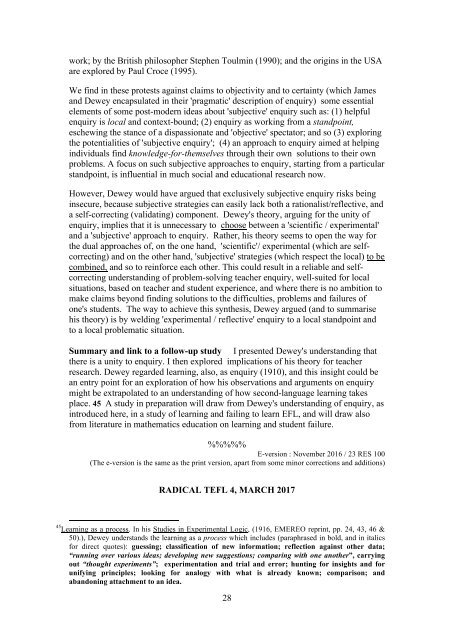RADICAL TEFL
2hqhXJd
2hqhXJd
Create successful ePaper yourself
Turn your PDF publications into a flip-book with our unique Google optimized e-Paper software.
work; by the British philosopher Stephen Toulmin (1990); and the origins in the USA<br />
are explored by Paul Croce (1995).<br />
We find in these protests against claims to objectivity and to certainty (which James<br />
and Dewey encapsulated in their 'pragmatic' description of enquiry) some essential<br />
elements of some post-modern ideas about 'subjective' enquiry such as: (1) helpful<br />
enquiry is local and context-bound; (2) enquiry as working from a standpoint,<br />
eschewing the stance of a dispassionate and 'objective' spectator; and so (3) exploring<br />
the potentialities of 'subjective enquiry'; (4) an approach to enquiry aimed at helping<br />
individuals find knowledge-for-themselves through their own solutions to their own<br />
problems. A focus on such subjective approaches to enquiry, starting from a particular<br />
standpoint, is influential in much social and educational research now.<br />
However, Dewey would have argued that exclusively subjective enquiry risks being<br />
insecure, because subjective strategies can easily lack both a rationalist/reflective, and<br />
a self-correcting (validating) component. Dewey's theory, arguing for the unity of<br />
enquiry, implies that it is unnecessary to choose between a 'scientific / experimental'<br />
and a 'subjective' approach to enquiry. Rather, his theory seems to open the way for<br />
the dual approaches of, on the one hand, 'scientific'/ experimental (which are selfcorrecting)<br />
and on the other hand, 'subjective' strategies (which respect the local) to be<br />
combined, and so to reinforce each other. This could result in a reliable and selfcorrecting<br />
understanding of problem-solving teacher enquiry, well-suited for local<br />
situations, based on teacher and student experience, and where there is no ambition to<br />
make claims beyond finding solutions to the difficulties, problems and failures of<br />
one's students. The way to achieve this synthesis, Dewey argued (and to summarise<br />
his theory) is by welding 'experimental / reflective' enquiry to a local standpoint and<br />
to a local problematic situation.<br />
Summary and link to a follow-up study I presented Dewey's understanding that<br />
there is a unity to enquiry. I then explored implications of his theory for teacher<br />
research. Dewey regarded learning, also, as enquiry (1910), and this insight could be<br />
an entry point for an exploration of how his observations and arguments on enquiry<br />
might be extrapolated to an understanding of how second-language learning takes<br />
place. 45 A study in preparation will draw from Dewey's understanding of enquiry, as<br />
introduced here, in a study of learning and failing to learn EFL, and will draw also<br />
from literature in mathematics education on learning and student failure.<br />
%%%%%<br />
E-version : November 2016 / 23 RES 100<br />
(The e-version is the same as the print version, apart from some minor corrections and additions)<br />
<strong>RADICAL</strong> <strong>TEFL</strong> 4, MARCH 2017<br />
45 Learning as a process. In his Studies in Experimental Logic, (1916, EMEREO reprint, pp. 24, 43, 46 &<br />
50).), Dewey understands the learning as a process which includes (paraphrased in bold, and in italics<br />
for direct quotes): guessing; classification of new information; reflection against other data;<br />
“running over various ideas; developing new suggestions; comparing with one another”, carrying<br />
out “thought experiments”; experimentation and trial and error; hunting for insights and for<br />
unifying principles; looking for analogy with what is already known; comparison; and<br />
abandoning attachment to an idea.<br />
28


